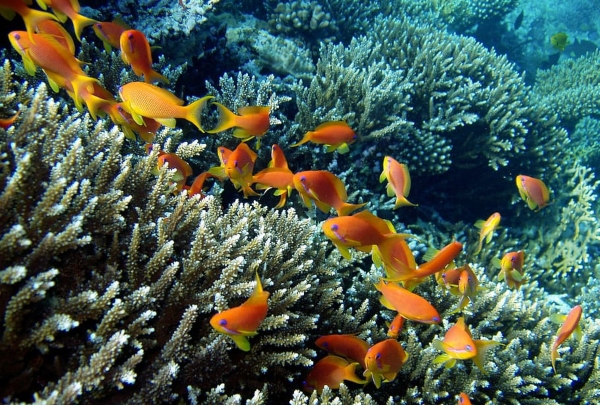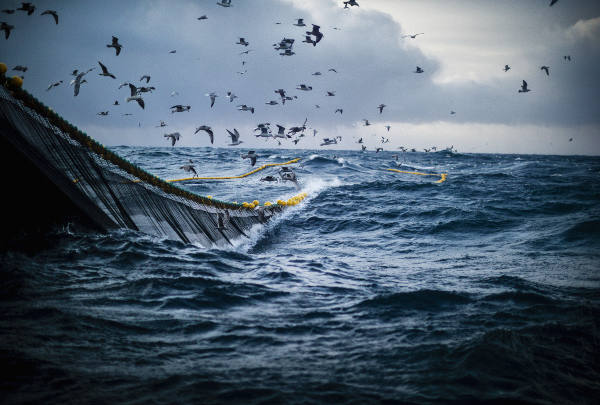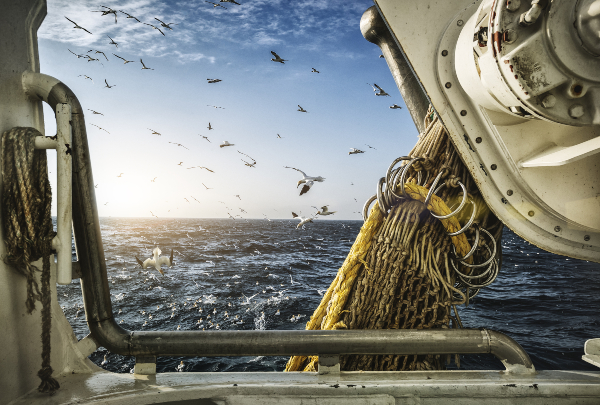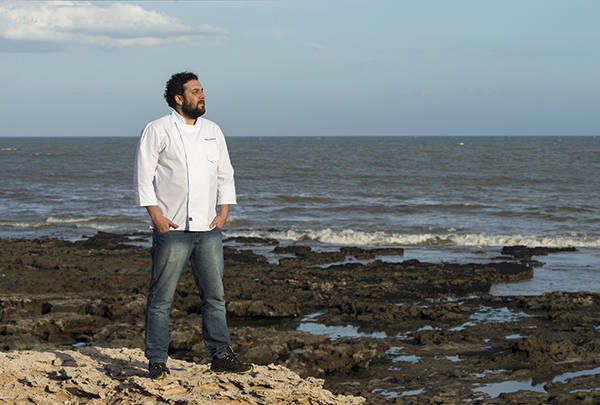Interview
Javier Garat: “For health and sustainability reasons, VAT on fish should be lowered to 4%, or even al 0%”

Javier Garat Pérez and María Luisa Álvarez Blanco respectively represent the first and last link in the Spanish fishery value chain. The first is secretary general secretary of te Spanish Fisheries Confederation, which represents fishing shipowners, fishery companies and vessels and more than 10,000 fishermen. The second is the director of Fedepesca, the association that represents more than 7,000 traditional fishmongers. Together, they capture the image of an industry that, although it hasn’t stopped during the Covid-19 crisis, continues to suffer “because of the lack of subsidies and generational replacement”.
Their viewpoint isn’t one-sided. They are speaking on behalf of an industry that “feeds people with the healthiest animal protein that exists” and thereby helps the environment and the future of humanity which would be “unsustainable otherwise”. From their respective fronts, they raise their voices to advocate for greater awareness and are asking for the industry’s VAT to be lowered to promote a healthy diet.
They are defending the Spanish fishery sector – “unique and a world leader” – for its operating practices which are “far superior to Asia’s whose products flood the market”. They would like the public to know the situation as it is so that they can act accordingly and buy locally “to defend our food sovereignty”. It is no wonder, Garat suggests, “that Jesus Christ’s best friends, and then his apostles, were fishermen” The sea, they conclude on a more serious note, largely holds “the future of healthy human food”.
Let’s listen to them ahead of their talk at the 2nd Meeting of the Seas.
How is the industry in the wake of the Covid-19 crisis?
Javier Garat: Our industry is essential and strategic. Fishing hasn’t stopped completely, and activity has continued partially. We are committed to feeding people with the healthiest animal protein that exists. However, and because the Horeca canal was shut during the state of emergency, the demand for some seafoods all but disappeared and it still hasn’t recovered, for instance shellfish, swordfish, shark, wild turbot and sea bream. The coming months are going to require, in addition to financial aid policies, solidarity from customers.
María Luisa Álvarez: It’s been a few intense months, working very hard, trying to reconcile protecting people’s heath with supplying fresh basic food products safely. We lost our sales to the hospitality industry, although this has been mitigated by an increase in direct home sales.
You’ve publicly asked for more financial aid. Is it coming?
JG: Not yet, but it is being processed through the European Maritime and Fisheries Fund (EMFF). This includes aid to shipowners and crew members as a result of temporary fleet stoppages, increased funding for fisheries producer organisations and storage aid. We have also asked for industry regulations to be made more flexible, calling for the elimination of bureaucratic procedures that get in the way of our activity. We have also called for supermarket distributors to prioritise Spanish and EU fisheries production, thus promoting so-called food sovereignty. In our opinion, this concept is fundamental in building a stronger and more sustainable food system based on EU production standards against massive imports from some countries, especially from South East Asia.
MLA: The retail sector has been left out of the subsidies that were increased under the EMFF. We’ve had three deaths in Madrid and 10% of employees on leave due to Covid-19, so many companies have had to close at least for a while with no financial assistance whatsoever. The companies whose losses haven’t exceeded 75% of turnover haven’t received any assistance either, and it is impossible to keep going with just 30 or 40% of turnover. Cash subsidies have been helpful, but rather than all these loans, direct aid to the companies would have been more useful, like they did in Germany.
As an essential sector that’s been hard at work bringing fresh food, wellbeing and normalcy in a distressing situation, fishmongers should be treated in the future as essential like healthcare or State security forces. It must be acknowledged that food supply and its value chain have been crucial in the country maintaining a semblance of normalcy during such a difficult time.
Will we go back to normal? What could be changed to make things better for the sector?
JG: Ideally, common sense should prevail and all the players involved in the regulation of this activity should be aware of its importance as a source of healthy food for the world's future population which in 2050 will include another 3bn people. I’m pointing this out because we’re also facing the challenge of climate change, and many people don’t know that the carbon footprint of fishing activities is considerably lower than that of any other industry. I believe that these factors sooner or later will become apparent to everyone. We, in the industry, know it and we trust that soon so will politicians, environmental groups and consumers themselves.
MLA: I hope that they finally realise the considerable amount of work involved in food supply chains and fishery’s in particular – fishers, transporters, wholesalers, processors, retailers, etc. We should aim to make these activities better regarded and offer professional training which for example doesn’t exist in food retail. We need to strive for generational replacement so that there continues to be interest in keeping the activity going. The whole Spanish fishery value chain is unique and a world leader, and so is specialist retail trade. Spain’s network of fishmongers has no match anywhere else in the world. This is why it is important to have policies that enable the continuity of this local, proximity trade by lowering VAT on fishing products.
As the title of your Meeting of the Seas talk suggests, how can we increase fish consumption? By lowering VAT?
JG: What matters is information and knowledge. We have to make sure that people know about the wonders of fish protein in the human diet by promoting its consumption. Fish also has to be made more competitive, which is why we’ve been asking for VAT on fish to be lowered from 10% to 4%, on par with other basic food products such as milk or bread.
MLA: We’re constantly looking for ways to protect ourselves, to look after ourselves and live sustainably, and one of our big allies in doing this is fish products. In a country where half of the population is overweight, where obesity figures and diseases related to bad food habits are rising, we need a government that truly invests in a healthy eating policy. And this includes reducing our industry’s VAT rate, possibly even to 0%. This is already happening in the UK.
Lockdown seems to have brought to light the value of the primary sector. Have you noticed? Do you agree?
JG: Consumers are increasingly better informed about what they eat, where their food comes from and its health benefits and, it is true that we’ve noticed this trend, although very mildly. In addition to knowing fish products, I think it’s important for consumers to know how it is caught or how it is processed. Every year, Europe imports 79,500 tonnes of tuna steak -- mostly used in canning – which comes from Asian fisheries that don’t pay tariffs. The problem is that, besides the fact that many of them practice illegal fishing, working conditions on those vessels are dreadful, there are even some cases of human slavery and fundamental rights violations. Consumers need to know this and be free to choose between products that come from these sources and those from European fisheries, whose practices are sustainable from an environmental as well as a labour point of view.
MLA: Spanish people have become conscious of the importance of the food supply chain and traditional shops in particular, which have grown the most according to Ministry statistics. Because of safety, proximity, because we have been able to adapt and provide ad-hoc home deliveries. We’ve doubled the time dedicated to each customer, so although we’ve increased our income from home sales, we’ve lost profitability. But the sector’s priority is being up to customers’ demands and looking after them, which I think we’ve achieved. People have rediscovered traditional and specialist shops and we hope that they continue to appreciate us.
One final question. Is the solution to many of our problems in the sea?
JG: Without a doubt. The human species has always been connected to the sea and will continue to be. It’s no wonder that Jesus Christ’s best friends, and later his apostles, were fishermen. The answer to many future uncertainties lies in the sea, and so does healthy human food. Future sustainability implies good fisheries management so that we can continue to feed people with low environmental footprint food products.
MLA: We have to be conscious that our seas and oceans need protecting. Fishing is sometimes seen as an issue but it is part of the solution. It is people’s lifestyle and behaviour that has caused the sea to be full of plastics and waste, which is why we must raise awareness about protecting our seas and that way protect life and diversity. It’s our way of life and we want to keep enjoying it.







